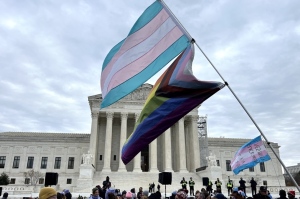#ChurchToo is a cautionary tale for Christian abuse activists (book review)

Emily Joy Allison was a homeschooled child of the 90s who was deeply involved in her Evangelical megachurch when she experienced abuse at the hands of a Christian leader. She is now a self-identified queer exvangelical poet in a same-sex marriage, who writes about “theology, politics, sex and social change.” Her journey from Point A to Point B is sketched in her book #ChurchToo: How Purity Culture Upholds Abuse and How to Find Healing, a blistering polemic against “purity teaching” which, she believes, creates a “culture of abuse” within the church and inflicts “very real harm” on women and girls.
Her book highlights substantial problems with how Evangelical churches and parents handle the topic of sex and, at the same time, highlights the slippery slope from #MeToo activism to apostasy.
Wolves among sheep
Allison launched the #ChurchToo hashtag on the heels of the #MeToo hashtag, which called attention to the sexual harassment and abuse of women, especially at the hands of powerful men. On Nov. 21, 2017, she shared her own story on social media: how, at the age of 16, she had been groomed by a 30-year-old church leader. She became convinced that he was offering her the kind of “God-honoring relationship” that her parents and her church had taught her about. Although he thankfully never touched her, he emailed her daily, talked to her in private using increasingly graphic language, told her he loved her, said he would marry her, and swore her to secrecy. Worse yet, when her parents discovered the abuse, they forced Allison to apologize to her abuser. He was dismissed from leadership, but the incident was “quietly swept under the rug by church leadership too ignorant or cowardly or both to do the right thing”.
Allison’s outrage here is legitimate. Too often, churches run damage control when their priority should be protecting current (and future) victims. Likewise, “Christian forgiveness” can be invoked to minimize the heinousness of an offense. Sexual abuse warrants church discipline and criminal punishment, and pastors need to be acutely aware of their duties both to God and to the civil magistrate.
Love thy body
Likewise, Allison is often correct when she criticizes sex education, or the lack thereof, within some Evangelical communities. Her own experience seems to have been woefully inadequate. In sixth grade, her parents gave her an awkward talk about “the bare-bones mechanics of biological procreation”, but their instruction was largely centered on rules about what was and wasn’t allowed (no holding hands until engagement, no kissing until marriage, etc.). It’s not at all clear that her parents provided her with a biblical vision of the goodness of sex or even accurate factual knowledge about her own body. As Allison tells it, her parents treated sex as a taboo and extremely embarrassing subject, a temptation to be ignored and avoided, not a joyful part of marriage.
Such ignorance can produce all kinds of negative outcomes. How much harder will it be for victims to come forward within the church if sex is already shrouded in silence? Should girls feel that they alone bear the responsibility for the sexual temptations of boys? And is a wholly negative view of sex compatible with the Bible’s candid celebration of conjugal love in Proverbs or Song of Solomon?
However, if Evangelicals can learn from Allison’s criticisms, we can learn even more from her serious errors.
Down the slippery slope
Occasionally, Allison has been approached by well-intentioned Evangelicals who want to curb what they see as the unbiblical excesses of the modern purity movement. But Allison is clear: she doesn’t want to reform purity culture; she wants to burn it down. Moreover, she emphatically denies the idea that “purity culture” is about extrabiblical rules regarding PG-13 movies or skirt lengths. Rather, she defines purity culture as “the spiritual corollary of rape culture [which teaches] complete sexual abstinence until legal, monogamous marriage between a cisgender, heterosexual man and a cisgender, heterosexual woman for life — or else”. In other words, the biblical sexual ethic itself is the problem and must be utterly destroyed. Evangelicals who are tempted to enthusiastically amplify #MeToo activism need to be careful about where its arguments can lead.
For example, #MeToo highlighted the fact that victims of sexual abuse are often ignored or disbelieved. It also showed how powerful men could manipulate rules to their advantage. Its solution was to offer unqualified affirmation and validation to those on the margins and to dismantle patriarchal power structures. But how far can we apply these ideas? What if those on the margins are pushing to dismantle male eldership or biblical injunctions against homosexuality and extramarital sex? What if they reject anti-abortion laws as attempts to control women’s bodies?
Allison is content to follow #MeToo reasoning to its logical conclusion and does indeed advocate for all of the above: premarital sex (“[extramarital sex] is a perfectly normal thing to do”), LGBT inclusion (“homophobia is sexualized violence”), abortion (“claiming scientific consensus around ‘when life begins’ is a fantasy at best”), and even adultery ( “ethical nonmonogamy”). But Evangelicals who rightly reject all these positions need to retrace their steps.
Cures and diseases
Finally, Allison believes that her own life demonstrates the havoc wrought by purity culture. In her early 20s, she began to “deconstruct the purity teachings [she] had been handed down as gospel”. Shortly after college, she became estranged from her family due to their “theological opinions and disdain for [her] work around faith and sexuality”. Though she had dated men her whole life and married a man, she later came out as queer and divorced him. In 2018, she was diagnosed with bipolar disorder and has been going to therapy and taking medication to heal from the “cornucopia of trauma” that she endured. According to Allison, all of these outcomes are the downstream effects of purity culture. Her friend Laura, a psychotherapist who specializes in religious trauma, puts it succinctly: “Purity culture is sexual abuse”.
What should Christians think about all this? First, we have to ask whether Allison's approach will actually help victims of abuse. Yes, her experiences were horrible. But is it responsible or even plausible to chalk up the negative outcomes of her life to unhealed (and possibly unhealable) trauma? Don’t her own choices matter?
Second, we should ask whether the consent-based, sex-positive lifestyle that Allison now commends leads to actual health and happiness, even at a purely secular level. Numerousstudies show that marital satisfaction is inversely correlated with the number of a person’s lifetime sexual partners. Even if we’re only concerned with a person’s temporal happiness, perhaps commending a “you do you” approach to sexuality isn’t ideal.
Finally, Allison’s deconstruction has gone all the way down, beyond her views on sexuality to the very foundations of her faith. She now attends a “very small, very gay Episcopal church” but does not say the creeds and occasionally skips worship to “sleep in, do yoga, and get mimosas at the local lesbian bar”. I don’t think Allison is being excessive here; I think she’s merely being consistent. You can commit to a progressive vision of “sexual liberation” or you can commit to Jesus. You can’t commit to both.
Conclusions
Evangelicals should repudiate sexual abuse and should ask hard questions about whether ignorance, incompetence, and institutionalism have obstructed attempts to address it. But Allison’s journey should serve as a warning to us. She was grievously sinned against, and she has also committed grievous sin against God, turning away from the only one who can offer her real forgiveness and real healing. No matter how much wholeness and peace she claims to have found (and to be honest, she doesn’t claim to have fully found either), we should remember Jesus’ question in Mark 8:36: “What shall it profit a man, if he shall gain the whole world, and lose his own soul?” Jesus came to give us life and life in abundance (John 10:10). I pray that Allison finds it.
Dr. Neil Shenvi has an AB in chemistry from Princeton University and a PhD in theoretical chemistry from UC Berkeley. He is the author of two books, Why Believe?: A Reasoned Approach to Christianity (Crossway, 2022) and Critical Dilemma: The Rise of Critical Theories and Social Justice Ideology (Harvest House, 2023). In his spare time, he enjoys reading, weightlifting, and playing video games. He can be reached on Twitter at @NeilShenvi or through his website www.shenviapologetics.com.




























